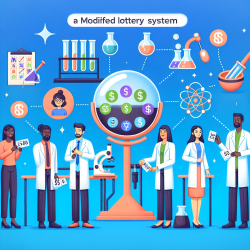Introduction
In the realm of scientific research, funding is a critical component that determines the feasibility and success of projects. However, the traditional peer review system for allocating research funds has faced significant criticism for its inherent biases and inefficiencies. The editorial "Research Funding: the Case for a Modified Lottery" by Fang and Casadevall (2016) proposes an innovative approach to address these challenges: a modified lottery system. This blog explores the potential benefits of implementing such a system, particularly for practitioners in the field of speech-language pathology and education, and encourages further exploration and research into this novel funding mechanism.
The Current Challenges in Research Funding
The traditional peer review process, which ranks proposals based on perceived merit, has been criticized for its inability to accurately predict the success of research projects. Studies have shown that the correlation between grant application scores and actual research productivity is weak, suggesting that the current system may not effectively prioritize the most promising projects. Furthermore, the peer review process is susceptible to biases related to gender, race, and institutional affiliation, which can skew funding decisions and limit diversity in the research community.
The Case for a Modified Lottery System
The modified lottery system proposed by Fang and Casadevall involves a two-stage process. In the first stage, peer review is used to identify a pool of meritorious proposals. In the second stage, funding decisions are made through a lottery among these proposals. This approach aims to reduce bias and increase fairness by minimizing the influence of subjective judgments in the final funding decision.
Potential Benefits for Practitioners
For practitioners in speech-language pathology and education, a modified lottery system could have several advantages:
- Increased Diversity: By reducing bias, the system could enhance diversity among funded researchers, bringing in a wider range of perspectives and ideas.
- Encouragement of Innovation: With a more equitable chance of funding, researchers may be more inclined to propose innovative and high-risk projects that could lead to significant breakthroughs.
- Reduction in Administrative Burden: A lottery system could streamline the funding process, allowing researchers to spend more time on their projects rather than on grant writing.
Encouraging Further Research
While the modified lottery system presents a promising alternative to the traditional peer review process, it is essential to conduct further research to evaluate its effectiveness in different contexts. Practitioners are encouraged to explore this funding model in their institutions and contribute to the growing body of evidence on its impact.
To read the original research paper, please follow this link: Research Funding: the Case for a Modified Lottery.










